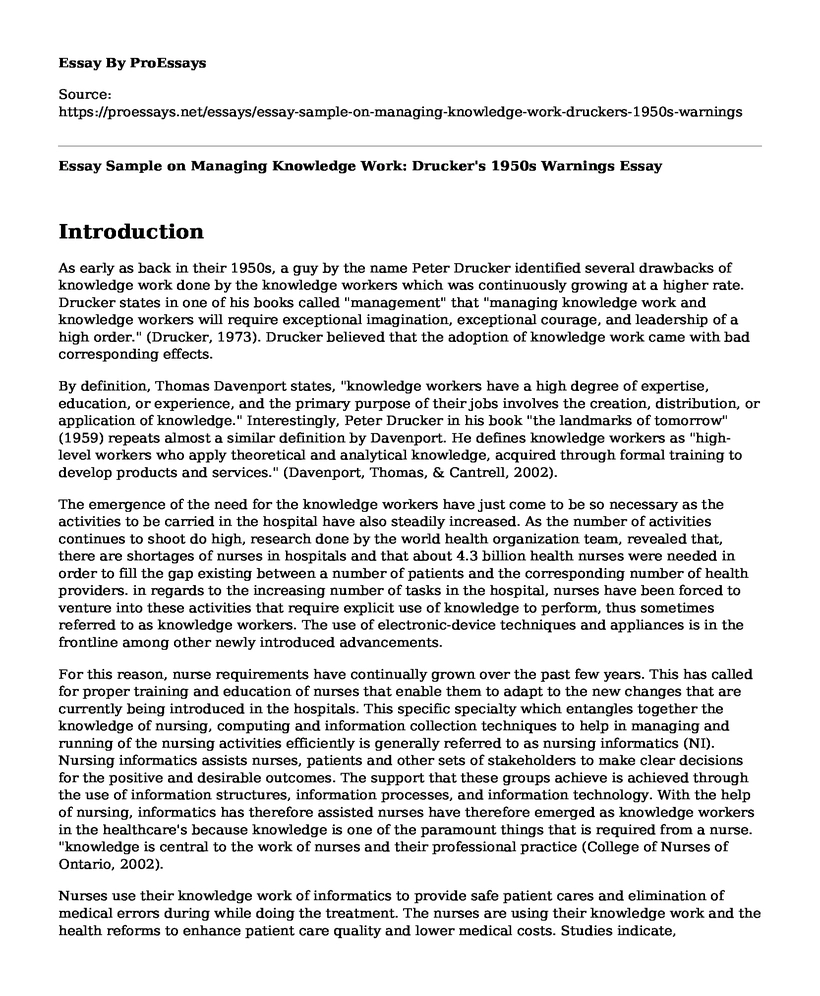Introduction
As early as back in their 1950s, a guy by the name Peter Drucker identified several drawbacks of knowledge work done by the knowledge workers which was continuously growing at a higher rate. Drucker states in one of his books called "management" that "managing knowledge work and knowledge workers will require exceptional imagination, exceptional courage, and leadership of a high order." (Drucker, 1973). Drucker believed that the adoption of knowledge work came with bad corresponding effects.
By definition, Thomas Davenport states, "knowledge workers have a high degree of expertise, education, or experience, and the primary purpose of their jobs involves the creation, distribution, or application of knowledge." Interestingly, Peter Drucker in his book "the landmarks of tomorrow" (1959) repeats almost a similar definition by Davenport. He defines knowledge workers as "high-level workers who apply theoretical and analytical knowledge, acquired through formal training to develop products and services." (Davenport, Thomas, & Cantrell, 2002).
The emergence of the need for the knowledge workers have just come to be so necessary as the activities to be carried in the hospital have also steadily increased. As the number of activities continues to shoot do high, research done by the world health organization team, revealed that, there are shortages of nurses in hospitals and that about 4.3 billion health nurses were needed in order to fill the gap existing between a number of patients and the corresponding number of health providers. in regards to the increasing number of tasks in the hospital, nurses have been forced to venture into these activities that require explicit use of knowledge to perform, thus sometimes referred to as knowledge workers. The use of electronic-device techniques and appliances is in the frontline among other newly introduced advancements.
For this reason, nurse requirements have continually grown over the past few years. This has called for proper training and education of nurses that enable them to adapt to the new changes that are currently being introduced in the hospitals. This specific specialty which entangles together the knowledge of nursing, computing and information collection techniques to help in managing and running of the nursing activities efficiently is generally referred to as nursing informatics (NI). Nursing informatics assists nurses, patients and other sets of stakeholders to make clear decisions for the positive and desirable outcomes. The support that these groups achieve is achieved through the use of information structures, information processes, and information technology. With the help of nursing, informatics has therefore assisted nurses have therefore emerged as knowledge workers in the healthcare's because knowledge is one of the paramount things that is required from a nurse. "knowledge is central to the work of nurses and their professional practice (College of Nurses of Ontario, 2002).
Nurses use their knowledge work of informatics to provide safe patient cares and elimination of medical errors during while doing the treatment. The nurses are using their knowledge work and the health reforms to enhance patient care quality and lower medical costs. Studies indicate,
Improving access includes the media and technology that is being used and in that process, the quality of the material that is being introduced to the society will be decreased because of relying implantation of the electronic health but It is very helpful to healthcare because it provides the conceptualizing in a way of managing data entry and analysis systems. (Ward & Kozakowski, 1987)
Perhaps, nurses have been recently trained with the nursing informatics, to relevantly use the electronic methods of collecting and analyzing patient's data in hospitals in more presentable and accurately by eradicating all the possible loopholes in the Medicare.
References
College of Nurses of Ontario (2002). Professional standards, Revised 2002. Toronto, ON: College of Nurses of Ontario. Retrieved from www.cno.org.
Ward, S., & Kozakowski, J. (1987). The Nurse as the Knowledge Worker. AORN Journal, 46(5), 896-903. doi: 10.1016/s0001-2092(07)67412-2
Drucker, P. F. (1973). Management: Tasks, Responsibilities. Practice, 125.
Davenport, T. H., Thomas, R. J., & Cantrell, S. (2002). Knowledge-worker performance. MIT Sloan management review, 39(2), 43-43.
Cite this page
Essay Sample on Managing Knowledge Work: Drucker's 1950s Warnings. (2023, Jan 16). Retrieved from https://proessays.net/essays/essay-sample-on-managing-knowledge-work-druckers-1950s-warnings
If you are the original author of this essay and no longer wish to have it published on the ProEssays website, please click below to request its removal:
- Essay on Impact of Leadership on the Implementation of a Current or Recent Development
- Purchasing Agent for Zircon Delivery Services: Accept or Don`t Accept the Offer
- Multidisciplinary vs Interprofessional Teams in Medicine Essay
- Essay Example on Social Media's Impact on Politics: Making Leaders More Accessible
- Essay Sample on Organizational Change: Driving Improvement and Efficiency
- Essay Example on 4 Topics of Management: A Comprehensive Analysis
- The Ideal Virtues of an Efficient Team Player - Free Essay Sample







